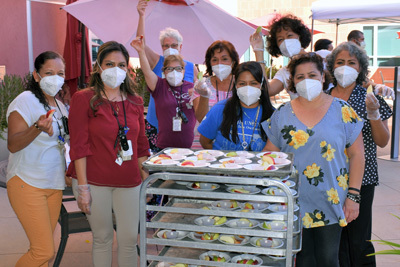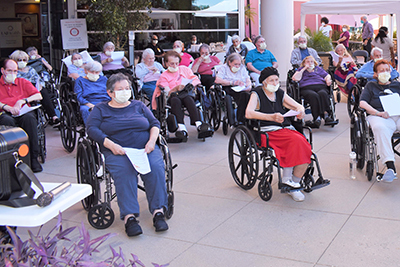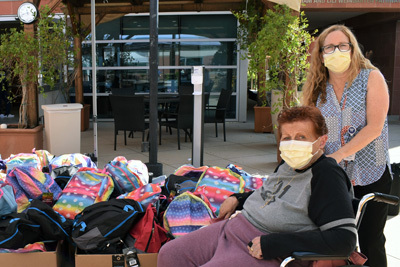At Los Angeles Jewish Health, High Holy Days Bring Blessing of Community


At Los Angeles Jewish Health, High Holy Days Bring Blessing of Community

Los Angeles Jewish Health residents always approach the High Holy Days with a sense of deep appreciation for having reached the start of another New Year. This year, our seniors have found even more reason to be grateful: the loosening of COVID restrictions to allow residents to celebrate the holidays with their loved ones.
"It's hard to put into words how exciting it is that, this year during the High Holy Days, we've finally been able to invite a small number of family members back onto our campuses," says Rabbi Karen Bender, Los Angeles Jewish Health's chief mission officer. "Over the past several years, in order to keep residents as safe as possible, we were mandated to hold off on inviting visitors to campus, so these High Holy Days have really signaled a dramatic, welcome change."
Rabbi Bender says services have been packed and that
events leading up to Rosh Hashanah and Yom Kippur were equally well attended.
"We held an apple and honey tasting across multiple campuses, which was
really wonderful," she says. "Taste and smell are two of the most powerful ways
to conjure up memories that can engage our residents and inspire them to share
their thoughts, feelings and life experiences."
According to Rabbi Bender, the apples and honey gatherings were significant for another reason, as well. "I like to point out to our residents that we don't hand people apples already dipped in honey; we give them the apples, and they dip them on their own," she says. "It's a symbol that every individual has the ability to influence the sweetness in his or her own life. We're more empowered than we think, and I believe that's a critical message for our incredible population of seniors."

The run-up to the holidays also included a special mitzvah project: Residents gathered together to assemble fully-stocked backpacks for students in need. Sponsored by generous Los Angeles Jewish Health donor Bill Prady, co-creator of the Emmy Award-winning television sitcom "The Big Bang Theory," the project allowed residents to partner with School on Wheels, a nonprofit organization that fields approximately 4,000 requests each year for backpacks from students experiencing homelessness. Los Angeles Jewish Health participants worked a fun assembly line-style to fill the backpacks with school supplies such as paper, pencils and folders, as well as special items such as puzzles, books and science kits.

"Jewish tradition teaches that we are inscribed in the Book of Life at Rosh Hashanah, and that the book is sealed at Yom Kippur," Rabbi Bender says. "One of our goals with the backpack project was to fulfill the commandment of the High Holy Days machzor (prayer book), which encourages us to focus these Days of Awe on tefilah (prayer), tzedakah (charity) and t'shuvah (repentance). This project enabled seniors to perform an act of tzedakah, and they were so happy to be a part of it."
Their enthusiasm,
Rabbi Bender notes, was beautiful to see. "A significant percentage of our
residents are recipients of other people's good deeds, whether it's our donors,
our volunteers or members of the larger community. It's challenging for them to
find opportunities to give back and make a difference the way they used to, when
they were more independent," she says. "Through this project, they were able to
realize they can still do things to help other people. It was truly thrilling to
watch and was easily one of the most moving things I've done in my time here."
As they were filling backpacks, dipping apples in honey and singing at
in-person holiday services, our residents enjoyed the benefits of built-in
community that living at Los Angeles Jewish Health makes possible.
"How many people in their 90s get to be with their peers at holiday time?" Rabbi Bender asks. "Not many, which is why our events this year have been so meaningful. It's such a blessing and a privilege to belong to this community."